|
|
|
Sort Order |
|
|
|
Items / Page
|
|
|
|
|
|
|
| Srl | Item |
| 1 |
ID:
077890


|
|
|
|
|
| Publication |
2007.
|
| Summary/Abstract |
The Kyoto Protocol has been ratified by 164 states and is now fully operational. However, the Bush administration's repudiation of the Protocol combined with the weakness of the targets raise a confronting question for students of legitimacy: is it possible for a regime to be legitimate but ineffective in solving the problem it is designed to address? I argue that effectiveness is an important component of the Protocol's legitimacy but that the parties have been reluctant to make an issue of effectiveness during the early phase of the Protocol's operation. However, the legitimacy of the Protocol is likely to wane, and the chronic international legitimacy crisis of the Bush administration's climate change policy is likely to become acute, as a result of poor performance. I conclude by suggesting what might constitute significant and timely adaptation that might resolve the US's chronic legitimacy crisis and the Protocol's waning legitimacy
|
|
|
|
|
|
|
|
|
|
|
|
|
|
|
|
| 2 |
ID:
053159
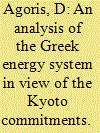

|
|
|
| 3 |
ID:
068409


|
|
|
| 4 |
ID:
109759
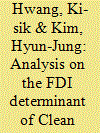

|
|
|
| 5 |
ID:
074353
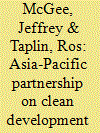

|
|
|
|
|
| Publication |
2006.
|
| Summary/Abstract |
The Asia-Pacific Partnership on Clean Development and Climate (AP6) has been marketed as an innovative new approach to international climate change policy that is complementary to the existing Kyoto regime. It is important to closely examine these claims of complementarity, given the two nations that were central to the formation of the AP6, the United States and Australia, have both expressly repudiated the Kyoto process. The difficulty involved in this exercise is in separating political rhetoric regarding complementarity from the reality of how the AP6 will likely impact upon the effectiveness of the Kyoto regime. This article discusses the AP6 and the various claims as to complementarity with Kyoto made during its formation in July 2005 and inaugural meeting in January 2006. For the purpose of analyzing these claims of complementarity five key features of the content of the AP6 are identified for comparison with Kyoto. Stokke's theory of regime interplay is used to assess how each of the five key features of the AP6 will likely impact upon the effectiveness of Kyoto. This analysis indicates that at fundamental levels of regime interaction the AP6 has significant potential to obstruct the effectiveness of Kyoto as currently framed. The conclusion to be drawn from this analysis is that the claims by AP6 parties as to complementarity with Kyoto are only defensible at a shallow ideational level with significant obstruction likely at more fundamental levels of regime interaction. The reality is that the AP6 offers a competing regime in international climate change policy that at the very least has significant potential to affect the future shape of Kyoto.
|
|
|
|
|
|
|
|
|
|
|
|
|
|
|
|
| 6 |
ID:
108149
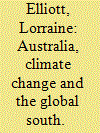

|
|
|
|
|
| Publication |
2011.
|
| Summary/Abstract |
Australia's climate change relationship with developing countries is framed by the 1992 United Nations Framework Convention on Climate Change and the 1997 Kyoto Protocol. Under those agreements, Australia has committed to take a lead in cutting greenhouse gas emissions and to provide technological and financial support to developing countries. In practice, Australian governments of both political hues have adopted a somewhat ambiguous and ambivalent attitude to developing countries within climate change politics and their fulfilment of those commitments has been uneven. This is particularly so if the concept of the 'Global South' is expanded from developing countries to include those people who are vulnerable to the environmental, social and economic impacts of climate change.
|
|
|
|
|
|
|
|
|
|
|
|
|
|
|
|
| 7 |
ID:
052332
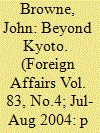

|
|
|
|
|
| Publication |
Jul-Aug 2004.
|
| Summary/Abstract |
Global warming is real and needs to be addressed now. Rather than bash or mourn the defunct Kyoto Protocol, we should start taking the small steps to reduce carbon dioxide emissions today that can make a big difference down the road. The private sector already understands this, and its efforts will be crucial in improving fossil fuel efficiency and developing alternative sources of energy. To harness business potential, however, governments in the developed world must create incentives, improve scientific research, and forge international partnerships.
|
|
|
|
|
|
|
|
|
|
|
|
|
|
|
|
| 8 |
ID:
062474
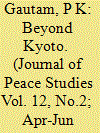

|
|
|
|
|
| Publication |
Apr-Jun 2005.
|
|
|
|
|
|
|
|
|
|
|
|
|
|
|
|
| 9 |
ID:
086723
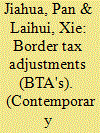

|
|
|
|
|
| Publication |
2009.
|
| Summary/Abstract |
As the target commitment period under the Kyoto Protocol nears its end, further measures are under consideration by all the parties to the UNFCCC to have effective emission reduction that will not damage the economy. In order to set a post 2012 emission reduction target, as individual party as player in the clmate game requires others to make comparable commitments for reasons of environmental effectiveness and international competitiveness.
|
|
|
|
|
|
|
|
|
|
|
|
|
|
|
|
| 10 |
ID:
103862
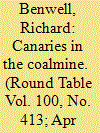

|
|
|
|
|
| Publication |
2011.
|
| Summary/Abstract |
Climate change presents a useful case in the study of small states because their interests can be differentiated from larger states. Small states are expected to respond to international politics, not to lead. The development of the climate regime has seen small states engage in a 'grand strategy' to achieve climate change mitigation. The apparent powerlessness of small states and the nature of the public good problem are central to understanding small states' negotiating power in the climate regime. They have capitalised on their victim status and the common interests of all states to act as regime leaders; but they have not achieved all of their objectives in terms of access to finance and technology. This suggests that while small states share the difficulties of other developing states in pursuing value-claiming goals, they may have a comparative advantage as norm-entrepreneurs.
|
|
|
|
|
|
|
|
|
|
|
|
|
|
|
|
| 11 |
ID:
121781
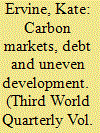

|
|
|
|
|
| Publication |
2013.
|
| Summary/Abstract |
The United Nations Clean Development Mechanism (cdm) has been envisaged as a powerful tool for reconciling the global South's environment and development problematic. By allowing Southern states to produce and sell carbon credits into the Kyoto Protocol's compliance market, many predicted a growing North-South transfer of carbon finance, technology and profit. Confronted by deep crisis in global carbon markets, however, the cdm, rather than spurring development, is furnishing the conditions for rising debt and insecurity since project costs must be financed upfront, with the expectation that future project revenue will subsequently fulfil these obligations. This paper analyses the dialectic entanglements between the cdm's ex post and market-dependent financing structure, the carbon market crisis and uneven development, based on the contention that cdm-related debt reveals the deeply unequal power relations that underpin contemporary approaches to climate change mitigation, whereby the North's ecological debt is displaced, both materially and financially, onto Southern actors.
|
|
|
|
|
|
|
|
|
|
|
|
|
|
|
|
| 12 |
ID:
090888
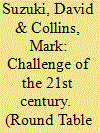

|
|
|
|
|
| Publication |
2009.
|
| Summary/Abstract |
This article outlines the gravity of the environmental crisis-pollution, climate change, overpopulation and the unpredictable environmental impacts from our use of science and technology and exploitation of natural resources. We must put the 'eco' back into economics and realise what the conditions and principles are for truly sustainable living. We have to set a new bottom line, a bottom line dictated by the reality that we are biological creatures, completely dependent for our survival and well-being on clean air, clean water, clean soil, clean energy and biodiversity. We are social animals who need strong families and supportive communities, full employment, justice, equity and security and freedom from racism, terror, war and genocide. And we remain spiritual beings who need sacred places in the natural world that gave us birth.
|
|
|
|
|
|
|
|
|
|
|
|
|
|
|
|
| 13 |
ID:
112807
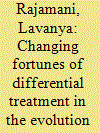

|
|
|
|
|
| Publication |
2012.
|
| Summary/Abstract |
This article traces the evolution of international environmental law and dialogue in the four decades from Stockholm, 1972, to Rio+20, 2012, with a focus on the changing dynamics of the discourse between developed and developing countries, and the corresponding interpretational shifts in the application of differential treatment in international environmental law-climate change law in particular. This article argues that in the first three decades of environmental diplomacy, from 1972 to 2002, the international community witnessed an exponential growth in the number and range of multilateral environmental agreements, an array of tools, techniques and practices, and a rapid expansion of differential treatment in favour of developing countries. Differential treatment in central obligations, albeit disputed from its inception, found pride of place in the Kyoto Protocol negotiated in 1997. The decade that followed, 2002 to 2012, witnessed heightened popular and political mobilization around the climate change issue. But, in response to seemingly intractable difficulties across the North-South and North-North spectrum, it was accompanied by a retreat from differential treatment in central obligations. The battle over the future (or lack thereof) of the Kyoto Protocol, and the recent developments in the climate regime-in particular the 2011 Durban Platform Decision-testify to this retreat from certain variants of differential treatment, and interpretations of equity and common but differentiated responsibilities. An analysis of these developments and the politics that gave rise to them, reveal that while the international regime can survive the erosion of certain limited forms of differential treatment, a wholesale rejection of differential treatment, and of the 'equity' concerns that animate it, would destabilize the normative core of the regime as well as render the climate regime unattractive to key players like India.
|
|
|
|
|
|
|
|
|
|
|
|
|
|
|
|
| 14 |
ID:
099093
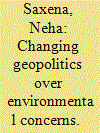

|
|
|
| 15 |
ID:
161252
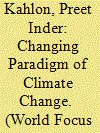

|
|
|
|
|
| Summary/Abstract |
Climate change, a scientific issue, has become a highly debatable and politically motivated issue in last three decades. The Kyoto protocol represents an important milestone in international efforts to address climate change. But it failed to catch up with the changes occurring at global level due to lack of clarity at policy level and division of globe into Annex I and Non-Annex I nations.
|
|
|
|
|
|
|
|
|
|
|
|
|
|
|
|
| 16 |
ID:
095941
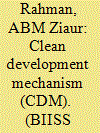

|
|
|
| 17 |
ID:
118078
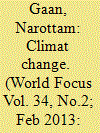

|
|
|
| 18 |
ID:
166547
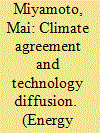

|
|
|
|
|
| Summary/Abstract |
This study examines the Kyoto Protocol's impact on the international diffusion of renewable energy technologies including solar and wind energy. Using patent application data of 133 countries from 1990 to 2013 and a difference-in-difference approach, we find that the Kyoto Protocol increased international patent applications from the countries with emission targets. The effect appeared over many years during the period studied, particularly for solar energy technology. When we focus on countries with more stringent targets, the effect of the Kyoto Protocol is even stronger. For these countries, the Protocol's impact on the numbers of applications for international patent persisted strongly, even for wind energy technology. Moreover, we find a similar effect for the international patent applications filed in four developing countries that are large emitters of greenhouse gases: Brazil, China, India, and Mexico. These results suggest that the Kyoto Protocol stimulated international patenting activities from countries that are committed to stringent targets for climate mitigation. Our results endorse the importance of climate change agreements for international diffusion of technology.
|
|
|
|
|
|
|
|
|
|
|
|
|
|
|
|
| 19 |
ID:
137583
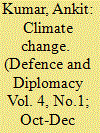

|
|
|
| 20 |
ID:
157567
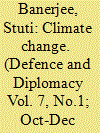

|
|
|
|
|
|
|
|